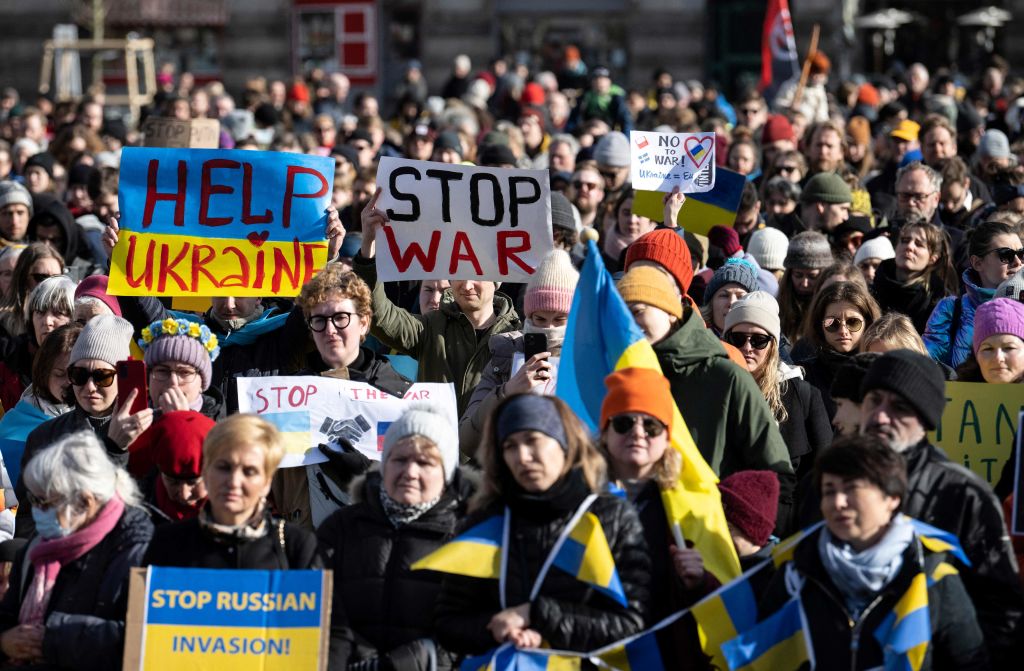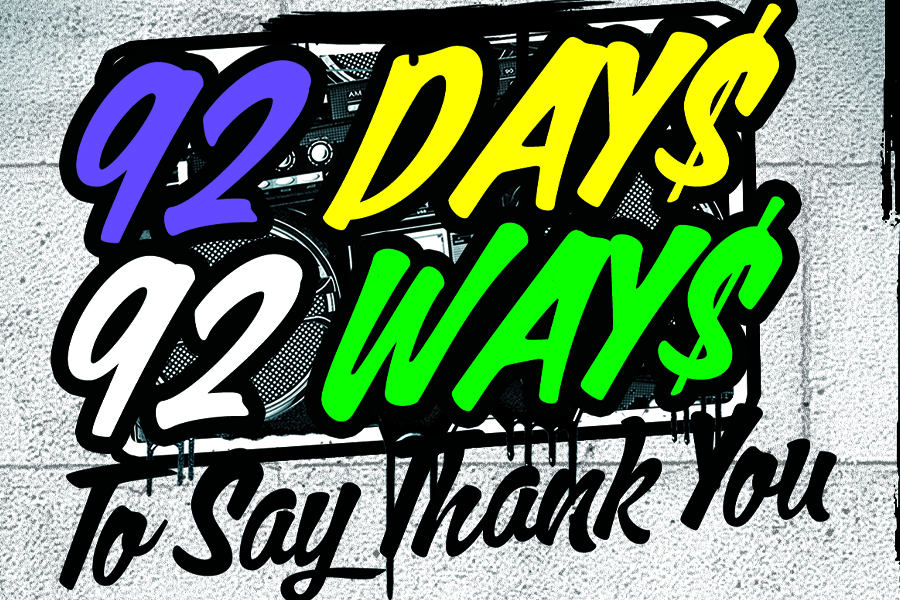Thousands Of Africans In Ukraine Abandoned, Turned Away At Borders, And Forced Off Refugee Trains While Fleeing Russian Invasion
No matter where in the world international tensions turn into violent conflict, anti-Blackness still seems to be the big joker.

Source: JOHAN NILSSON / Getty
While Ukraine has captured the world’s attention and sympathy as the target of a Russian invasion, Al Jazeera reports thousands of African citizens working and studying in the country have been left stranded. Since Russian President Vladimir Putin ordered a “special military operation” against Ukraine on Thursday, more than 200 civilians are dead and about 1,100 are injured. Over 100,000 people in Ukraine have been displaced according to United Nations estimates, but Black refugees are saying they’re on their own.
This Nigerian man in Ukraine, Tolulope Osho, is helping people in war zones get to safety in Poland. His Instagram page is @cowriesking #AfricansInUkraine #NigeriansInUkraine #RussiaUkraineWar pic.twitter.com/ZEpQAt1N9n
— Adeola Fayehun (@AdeolaFayehun) February 26, 2022
“I drove from Kyiv. We are trying to survive. We don’t want to die in a foreign country,” said software engineering student Samuel George about trying to cross the border into Poland. “They are not officials, police or military. They are normal citizens who stopped us Africans from driving to the border. They let Ukrainians pass through but not us.”
He also said they took his money and refused to let him drive any further, forcing him to flee for his life on foot in dangerously cold sub-zero temperatures.
“I’m now walking to the border. I have no other option. I don’t know how much further the border is. They even took our money. It is like they are not human beings,” George told Al Jazeera.
Thousands of African students are stranded across Ukraine amid a Russian invasion. @D_J_Doyle has more. pic.twitter.com/NB0qTwY5BM
— Reuters Africa (@ReutersAfrica) February 26, 2022
The #AfricansInUkraine tag is full of similar heartbreaking stories of inhumane treatment. Morocco, Nigeria, and Egypt are in the top 10 countries with students in Ukraine, with over 16,000 students coming from just those three nations. According to the Polish Ministry of Internal Affairs, the country accepted 115,000 people from Ukraine even without passports, but Ukrainians refuse to let Black refugees leave the country.
Pray for Ukraine🤲🏾🇺🇦
We would have loved to go back home,we can’t,the airports are closed,we are evacuating from city to city and trying to leave the country on foot or by car. As foreigners in this country,we do not know what will happen next but God will never leave us,not now— Vukile Dlamini (@vukiledlamini19) February 24, 2022
The official visuals of Ukrainians blocking Africans from getting on trains. #AfricansinUkraine pic.twitter.com/hJYpM3LY0A
— Damilare / ViF (@Damilare_arah) February 26, 2022
“The official visuals of Ukrainians blocking Africans from getting on trains,” Twitter user Damilare_arah wrote with thread of videos of Black people getting pushed and pulled away from trains for refugees fleeing Ukraine on Saturday.
#AfricansinUkraine Visuals of the day. Ukraine left African families stranded at the train pic.twitter.com/HDyYh40fgm
— Damilare / ViF (@Damilare_arah) February 26, 2022
Prioritizing women and children for buses and trains out of Ukraine didn’t apply to Black families, like the mother stranded at the border with her 2-month-old infant.
#AfricansinUkraine the community of Africans in Ukraine stranded at the boarder much of them women and children. — This is happening now
The lady in the video is holding a 2 month old and it’s 3°c outside we are in search of aid and hostels pic.twitter.com/Ae2Iwn4zpg
— Damilare / ViF (@Damilare_arah) February 26, 2022
“#AfricansinUkraine the community of Africans in Ukraine stranded at the border much of them women and children. — This is happening now The lady in the video is holding a 2-month-old and it’s 3°c outside we are in search of aid and hostels”
Another Tweeter named Nzekiev described the same discrimination in every attempt to escape the country by train and on foot
In the train stations here in Kyiv, children first, women second, white men third, then the remaining is occupied by Africans. This means that we have waited for many hours for trains here & couldn’t enter because of this.
Majority of Africans are still waiting to get to Lviv.
— Nze (@nzekiev) February 25, 2022
“In the train stations here in Kyiv, children first, women second, white men third, then the remaining is occupied by Africans. This means that we have waited for many hours for trains here & couldn’t enter because of this. The majority of Africans are still waiting to get to Lviv.”
Trekked for more than half a day to the border and still gotta be treated like shit here. Immediately the media guys with camera left, they start pushing us Africans to go back even when have formed a queue like we are pests to be get rid of.
— Nze (@nzekiev) February 27, 2022
“Trekked for more than half a day to the border and still gotta be treated like shit here. Immediately the media guys with camera left, they start pushing us Africans to go back even when have formed a queue like we are pests to be get rid of.”
Several other Africans had been stranded at the border in the freezing cold for days.
We met many Africans at the border, they have been here for 2 days but Ukrainian Police and Army refused to let them pass.#AfricansinUkraine pic.twitter.com/prY3oQ40ua
— Nze (@nzekiev) February 27, 2022
If the Russian war, ongoing pandemic, and racist Ukrainian vigilantes weren’t bad enough, Ukrainian police and army threatened to shoot the Black evacuees while only letting White Ukrainians pass.
Watch how they are threatening to shoot us!
We are currently at the Ukraine -Poland border.
Their Police and Army refused to let Africans cross they only allow Ukrainian.
Some have slept here for 2 days under this scorching cold weather, while many have gone back to Lviv. pic.twitter.com/47YG4gxFC4— Nze (@nzekiev) February 27, 2022
“Watch how they are threatening to shoot us! We are currently at the Ukraine -Poland border. Their Police and Army refused to let Africans cross they only allow Ukrainian. Some have slept here for 2 days under this scorching cold weather, while many have gone back to Lviv.”
Russia has already sent an estimated 150,000 troops, about half of its military forces, to invade Ukraine and the situation is only getting more dangerous by the second. This conflict has been a tragic reminder that anti-Black racism isn’t just an American problem or historical talking point; It’s a matter of life or death.




